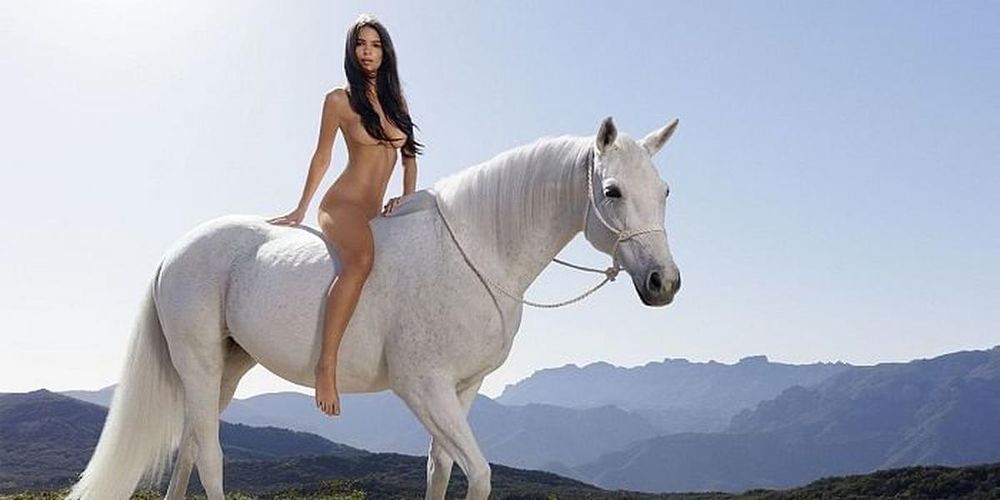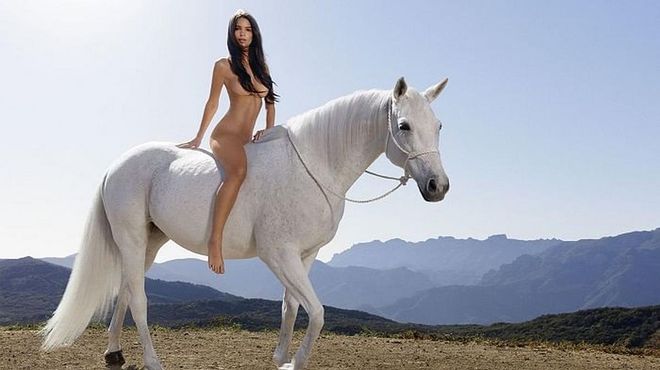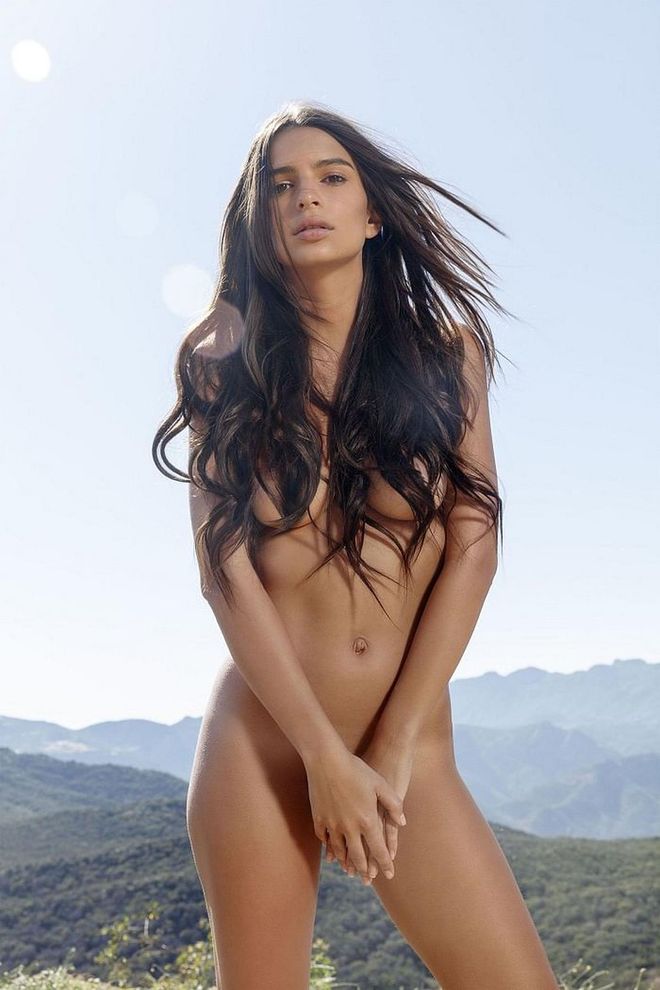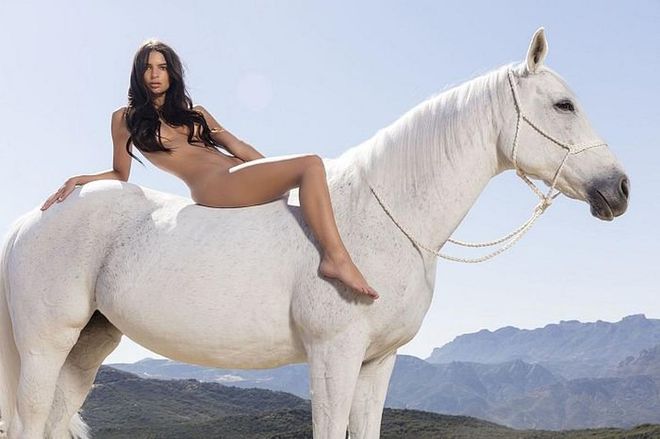Emily Ratajkowski's Gets Naked And Opens Up About Sexuality And Feminism
The actress sits down with the famed feminist author Naomi Wolf to discuss sexuality, shaming, and the notorious Kim Kardashian selfie


Photo: Mona Kuhn
Emily Ratajkowski
Meeting Emily Ratajkowski is like meeting the zeitgeist. I knew of the actress; I had been struck by her sympathetic portrayal of a lovelorn college student in Gone Girl. Though the camera had been all about her gleaming upper body as she played a love scene with Ben Affleck (tough day at the office, no doubt), I was impressed that she took the "slutty other woman" stereotype and played it with compassion. She is also an outspoken feminist, whether addressing body-image issues on Lena Dunham's site, Lenny, or challenging the haters with a topless, in-your-face Instagram alongside Kim Kardashian. At 25, Ratajkowski is plenty articulate. Her views reflect a dramatic shift in the culture, as many young women actually do call themselves feminists these days. Her politics, especially about the body (show it off), attention (why should women not want it?), assertion, and self-acceptance occurred to me as mostly very good news. Her peers, the children of a pornographic culture, are doing just what they should do, given the wash of objectified, naked bodies everywhere. They are engaged in establishing a new narrative to reclaim the body: From SlutWalk to Free the Nipple to promoting Body Positive agendas, it is obvious that they are not the sober puritans of feminism of yore. Do these actions raise real issues? Absolutely. I respect Ratajkowski's frank perspective, but I still wish she could have a huge career and keep her shirt on—if she wishes. Is her brand of fierce feminism the future? Probably. Am I glad that she and her peers, on-screen and off-, are speaking out, even if what she says sometimes makes me uneasy? Definitely.
NAOMI WOLF: All right, so you have been out there a lot recently. I'm getting the impression that there is a wave of Emily-ness going on.
EMILY RATAJKOWSKI: Is there a wave of Emily-ness?
NW: You're very candid about how you use your sexuality and your body and how you communicate.
ER: A lot of media attention came earlier this year from being a Bernie [Sanders] supporter. I could've said I was supporting anyone, and people would've been shocked and horrified. That became a moment, and then I wrote my essay, "Baby Woman," for Lena Dunham's newsletter.
NW: Which I read and really liked. The beauty of feminism is that there isn't a wave of historical erasure, like "Now it's your job."
ER: Well, I think it's everyone's job.
NW: I mean your generation's.
ER: Right, exactly.
NW: I want to hear your story. Where did you grow up?
ER: San Diego mostly, but I was born in London and lived there until I was five. We traveled a lot. But really San Diego is my hometown. It's where I went to high school.
NW: Were you interested in theater and performing as an adolescent?
ER: No, it started in London, actually. My mom was teaching there, and she would get a discount on plays. I was obsessed with it. Once we went to San Diego, I stuck with it. When I was 14, a lot of people said, "She's such a good actress, she loves theater, she looks like a woman, she should consider moving to L.A. and trying to do this professionally." My parents were hesitant, but they would take me.
NW: To go to auditions when you were 14?
ER: I started auditioning when I was 15 for the Disney and iCarly roles, but I didn't relate to those characters. They were archetypes that those shows specifically play into for prepubescent girls, where it's like the bitchy cheerleader …
NW: So you were modeling at that point too?
ER: I signed with an acting agent first; I wasn't really interested in signing with a modeling agent. But that same day they said, "You should go over to Ford." Then they signed me.
NW: How old were you then?
ER: Fourteen, but I looked exactly the same as I do now. They didn't know what to do—I looked like a woman.
Related article: Celebrity Diet Secrets: 8 Things Emily Ratajkowski Does To Stay In Shape

Photo: Mona Kuhn
Emily Ratajkowski
NW: It's a problematic space where someone is a child but perceived as a woman.
ER: I genuinely hit puberty before everyone. So I really was more sexual than my classmates. My teachers, my boyfriends, my parents' friends didn't understand how complex it all was. Because of third-wave feminism, I understood that there are all these fucked-up ideals of beauty put on young women; that there was something to be scared about in the entertainment world. But yet the people I knew in my everyday life, they [didn't realize] their faux pas, their missteps, and since they knew me it was that much harder because the comments felt personal.
NW: Can you give me an example?
ER: Once I had a teacher, who was a woman, snap my bra because she was mad that it was showing. She did it in front of the class.
NW: That's shocking.
ER: It was, like, something I became very used to. I had a girlfriend who was Venezuelan, and her body developed in a different way. I had big boobs, and she had a big butt. She would wear jeans with no pockets that would show it off, and we were constantly in trouble at school with the dress code. We were harassed, and, damn, that was the worst part of it.
NW: That's so obnoxious. So you were both having your bodies shamed.
"Sex is normal. Desire is normal. Attention is normal, and that's okay."
ER: I remember going to Forever 21 and buying this ridiculous pink thong underwear because I thought, "That's what you do, right?" It would pop out, and I'm sure that would bother people. But at the same time it might've been a tool that I didn't understand. Being part of a patriarchal society, it kind of helped me figure out what I was all about. I loved in your book The Beauty Myth when you talk about this ideal world where women could dress sexually casually and it wouldn't even be something that anyone would notice. For me, that's something I've lived by. I don't wear a bra all the time, and I don't think about it.
NW: I think you should be able to explore whatever you want to explore. Thong or no thong or overalls or shave your head or not. If they have a problem with my sexuality, that's their problem. Which leads me to your topless selfie with Kim.
ER: I didn't know her personally, but Kim posted this naked selfie in March, and there were black bars on her private areas. And there was this uproar, especially from Piers Morgan, who wrote this whole thing about "she's a mother, she's 35, it's ridiculous…"
NW: Wait, I don't understand—at 35, she's too old?
ER: "…She's too old and she's a mother, and we've given her enough attention, like she needs to stop doing this." That made me really angry. She wrote a few tweets responding to all the hate she was getting from this post, and then Piers said Kanye [West] had written those tweets, which also infuriated me to no end.
NW: Oh, my God! Jesus.
ER: A selfie is a sort of interesting way to reclaim the gaze, right? You're looking at yourself and taking a photo while looking at everyone. But also who cares? Kim's allowed to do what she wants. So I issued a series of tweets; she sent me flowers, thanking me, which was very sweet. We ended up running into each other and had this idea to take a similar selfie with our middle fingers up.
NW: Now, I'd also love a world where women could get plenty of attention for a picture like that clothed.
ER: Absolutely. Kim wrote, "We both have nothing to wear," because that was in reference to the original one. So this was very lighthearted. … I wrote, "We are more than just our bodies, but that doesn't mean we have to be shamed for them or our sexuality."
NW: It was a very political image, but I guess she can't necessarily think of it like that.
ER: Also, Kim is someone who could be criticized for a lot of different things about what she represents, but to me it was an important moment to say, "Even this person who you could criticize for all these different things doesn't deserve this response, right?"
NW: We've gotten to ground zero of this whole conversation, which is that there's still the fear and contempt of female sexuality and the just intolerable cultural reaction when women take ownership of their sexuality and their bodies.
ER: Kim said that to me. You know, when Lena Dunham takes her clothes off, she gets flack, but it's also considered brave; when Justin Bieber takes his shirt off, he's a grown-up. But when a woman who is sexual takes off her top, it plays into something.
Related article: Emily Ratajkowski Wears A Nearly-Naked Dress To The Harper’s Bazaar Icons Party

Photo: Mona Kuhn
Emily Ratajkowski
NW: I'll just jump in and say that any woman is sexual.
ER: Right, of course, but there is a distinction in the reaction between, for example, Kim taking off her shirt and Lena. It's not fair to either of them.
NW: Ya, it's fucked up. I'm sorry.
ER: It is. And I agree with you—any woman is sexual, absolutely.
NW: I wish that you and Kim and everyone who's creating cultural objects around their own bodies could have the right to define those images for themselves. At the same time I'm also seeing in that image the huge influx of pornography and the rigid definition of it. Women learn what a sexy woman is from porn or from airbrushed Victoria's Secret models, so I would love a world in which you don't have to look like that to say, "Screw you, I own my sexual body."
ER: True, but the world should not be exclusive of the ideal body. It has to include all ideals, all bodies. The whole idea is that when Kim takes a nude selfie, she's just seeking attention. That's not the issue. A woman can be seeking attention and also make a statement.They don't need to be mutually exclusive.
NW: It's true.What's more, I notice again and again, is that there's a deeply anti-feminist origin of mocking women for seeking attention.
ER: And I don't like that.
"When I post a selfie and someone comments, 'Oh, sure, go ahead and reclaim your sexuality, I got my rocks off,' that's not my problem."
NW: No, because you can't engage in history, or be a leader, without some drive for recognition. What I really like is that you are adding your words to the pictures and the images—and doing what you can to control the message—even though you can't control everything in the industry. But I also would like a world in which the girls looking at images of you, of Lena Dunham, and all the other women out there can still feel good about themselves.
ER: Right. And I mean, this is the body, this is the person that I am, so I'm limited to that body.
NW: Again, you don't have to apologize for being beautiful.
ER: That's something we really forget in this world, especially in my industry and being in the public eye as a female. There's this idea that if a man enjoys a photograph of a nude woman or if he likes your short skirt, he's taking something away from you.
NW: Yeah, that's unfortunate.
ER: It's not right. Sex is normal. Desire is normal. Attention is normal, and that's okay. That's really what slut shaming is, right? You talk about this in your book Promiscuities. A woman talks about having sex, and it's like, well, a guy got to have sex with you, so you're stupid. You've given something up.
NW: These attitudes come directly from the Victorian period. They're ridiculous, of course. The caveat is when you're in the performance profession; you're giving plea- sure with the performance. But if someone else uses your short skirt to undermine you or belittle you, that's not cool. That's also not your fault.
Related article: Kim Kardashian Sent Emily Ratajkowski Flowers For Defending Her Selfie
ER: It's also not my problem. It's irrelevant. When I post a selfie and someone com- ments, "Oh, sure, go ahead and reclaim your sexuality, I got my rocks off," that's not my problem.
NW: Do people really write that?
ER: Absolutely. On anything.
NW: That's disgusting. How do you choose what you post on social media from day to day?
ER: Some posts are more intentioned than others.That selfie with Kim was very intentioned, very direct. I had the tweets lined up for when it launched because I wanted those things to be what came with the image when the media started covering it. But then other times it's just a tool, you know? I'm a young woman who lives in a world of social media; I'll post boring things too! [Laughs.]
NW: When you have something to say, you have to make sure you keep some sort of naturalness, but it does get more challenging the more prominent you get.
ER: It's cool to have a format where you can be so direct with an audience. Social media is something women didn't have 10 years ago, and that's a big aspect in feminism today. I don't have to be filtered by anyone. I choose.
Sittings Editor: Jessica de Ruiter; Hair: David Babaii for Leonor Greyl; Makeup: Jo Strettell for Dior Addict; Manicure: Emi Kudo for Dior Vernis; Production: Joey Battaglia at Rosco Production.
From: Harper's BAZAAR US